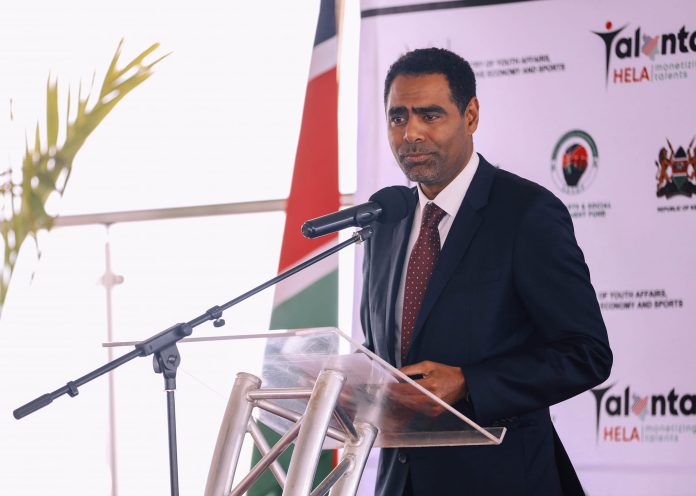Newly elected Football Kenya Federation (FKF) President Hussein Mohammed has laid out an ambitious plan to transform football into a key pillar of Kenya’s economic and social development. Speaking at the inauguration of the Local Organizing Committee (LOC) for the 2024 African Nations Championship (CHAN) and 2027 Africa Cup of Nations (AFCON), Mohammed emphasized the potential of football to create millions of jobs and significantly contribute to the country’s economy.
Football: A Catalyst for Economic Empowerment
As Kenya grapples with high unemployment rates and challenging economic conditions, Mohammed highlighted football as an untapped industry capable of addressing these issues. He called for the integration of football into the national economic agenda, focusing on its potential to engage the youth and generate employment opportunities.
“Football must be mainstreamed as an economic agenda for this country, and I hope we will embed it into the national agenda,” Mohammed said. “This is the only way we can constructively engage millions of youth and create job opportunities for them.”
Mohammed outlined the numerous revenue streams within the football ecosystem, including broadcasting, marketing, ticket sales, and merchandising. By fully leveraging these opportunities, he believes Kenya can unlock the economic potential of football and provide meaningful employment for its citizens.
Preparing Harambee Stars for Success
Hussein Mohammed stressed the importance of adequately preparing Kenya’s national football team, Harambee Stars, as the country prepares to host CHAN 2024 and AFCON 2027. He emphasized that Kenya must aim not just to participate but to perform competitively on the international stage.
“We must prepare Harambee Stars,” he said. “We need to ensure that our boys are ready and that they receive all the necessary support. We should not just participate for the sake of participation; we must put on a good show.”
Mohammed’s vision includes early investments in player development, access to modern training facilities, and the hiring of skilled coaching staff. He believes these steps will enable Harambee Stars to compete effectively against some of the best teams on the continent.
A Call to the Private Sector
Mohammed issued a strong appeal to Kenya’s private sector, urging companies to invest in football and take an active role in supporting the country’s sporting transformation. He specifically mentioned major corporations such as Safaricom, East African Breweries Limited (EABL), and banks as potential partners.
“I want to urge the private sector, please do not stay on the sidelines anymore,” he said. “It is a fresh start, a new beginning, and we need all the support we can get. Companies like Safaricom, EABL, and the banks must join hands with us.”
He emphasized that private sector involvement could significantly boost football development, particularly in areas such as infrastructure, grassroots programs, and league sponsorships. By working together, businesses and the FKF can create a thriving football ecosystem that benefits both the sport and the economy.
Infrastructure Development for CHAN and AFCON
Kenya’s co-hosting of CHAN 2024 and AFCON 2027 provides an excellent opportunity to showcase the country’s capability to host major international tournaments. Mohammed emphasized the importance of aligning infrastructure upgrades with the requirements set by the Confederation of African Football (CAF) to ensure successful events.
The FKF, in collaboration with the government, is prioritizing the refurbishment of key stadiums, including Moi International Sports Centre, Kasarani, and Nyayo National Stadium. These renovations, overseen by a Multi-Agency Team led by Sports Cabinet Secretary Kipchumba Murkomen, aim to meet CAF’s stringent standards.
CAF recently reaffirmed its commitment to Kenya as a co-host, citing the potential benefits of hosting these tournaments, including job creation, tourism growth, and increased global exposure for the country.
Patience and Long-Term Vision
Acknowledging the challenges ahead, Mohammed called for patience from stakeholders and the public as FKF embarks on its journey to transform football in Kenya. He assured everyone of his administration’s commitment to delivering meaningful results over time.
“I want to assure all Kenyans that we are up to the task,” Mohammed said. “Give us some time. I’m calling for a little bit of patience. We do not have a silver bullet, but eventually, we will get there.”
His long-term vision focuses on sustainable development, laying a strong foundation for football that will benefit future generations and elevate Kenya’s status in the global football arena.
Football’s Role in Job Creation
Hussein Mohammed emphasized how football can serve as a powerful engine for job creation, extending its impact beyond the pitch. He highlighted the various sectors that football can stimulate, including:
- Broadcasting and Media: Increased demand for live match coverage, analysis, and related content creates job opportunities for journalists, producers, and technicians.
- Marketing and Sponsorships: Football generates significant revenue through merchandise sales, sponsorship deals, and advertising campaigns, supporting jobs in marketing and retail.
- Stadium Operations: Hosting matches requires a workforce for ticketing, security, and event management, contributing to local employment.
- Tourism and Hospitality: International tournaments attract visitors, boosting local businesses in the tourism and hospitality sectors.
By investing in these areas, Mohammed believes that football can contribute significantly to Kenya’s economic recovery and create sustainable employment opportunities for thousands of Kenyans.
A New Era for Kenyan Football
Hussein Mohammed’s leadership marks the beginning of a new chapter for football in Kenya. His vision for integrating football into the national economic agenda, coupled with a focus on preparing Harambee Stars for success and engaging the private sector, presents a comprehensive plan for transforming the sport.
With CHAN 2024 and AFCON 2027 on the horizon, the FKF President’s roadmap offers a blueprint for leveraging football’s full potential to unite communities, drive economic growth, and inspire the next generation of Kenyan football talent.
READ NEXT:


